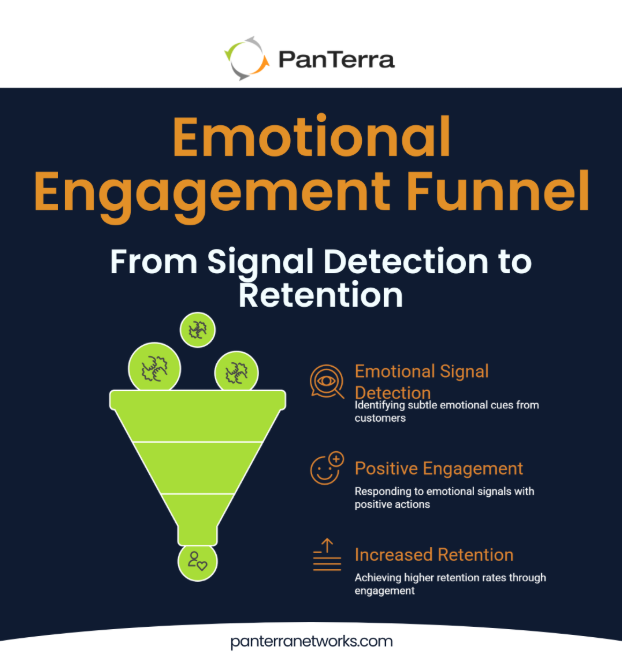The 5 Hidden Signals Driving Your Customer Engagement
July 28, 2025

You check your dashboard: 85% email open rate, thousands of social followers. 4.2 CSAT score.
You should be confident, but you know something feels off. And you're not alone.
93% of organizations say creating positive conversational experiences is a top priority, yet only 36% feel they’re truly effective at delivering them (Harvard Business Review).
Most businesses rely on “surface metrics” like clicks, opens, and follower counts because they’re easy to measure. But customers don’t think in dashboards. They feel. And those emotional signals—tone shifts, frustration, hesitation—remain invisible in traditional reports.
HBR shows us that brands investing in conversational platforms like Streams.AI see boosts in customer satisfaction (53%), brand reputation (51%), and customer trust (42%).
The real payoff comes when companies use these insights to act early:addressing friction, personalizing interactions, and connecting more meaningfully.
Why Do Traditional Metrics Fail at Conveying True Customer Engagement?
Do you know what actually happens when customers interact with your brand?
Most businesses operate with a dangerous blind spot. Dashboards flash impressive numbers, but the reality remains hidden. This creates a false sense of security.
The Surface Metrics Theater
What metrics fill your reports? Email opens, social media likes, website clicks, and monthly active users cast shadows on business reality. Companies track these vanity metrics because they're easy to measure, not because they predict success.
Surface metrics resemble the tip of an iceberg, visible yet revealing little about what lurks below.
Many organizations celebrate a 3.7X increase in purchases through effective email marketing without understanding which specific elements drove that success. These numbers look good on paper but tell an incomplete story.
The Hidden Data Below
Beneath visible measurements lies a wealth of emotional signals that truly indicate customer satisfaction.
You might miss the three-second pause before a customer hangs up. Or perhaps the subtle shift in tone during support calls goes unnoticed. Even the pattern of channel switching when frustration builds tells a story.
These hidden engagement signals reveal customer sentiment far more accurately than any dashboard metric.
Research shows that, in fact, 83% of users who received positive engagement in their first 30 days demonstrated higher retention rates. This proves the value of emotional connection.
Companies achieving a 67% retention benchmark understand that early customer interactions shape long-term relationships.
What makes these signals so powerful? They capture intent and emotion rather than passive actions. A customer who opens 10 emails but never responds sends a different message than someone who replies immediately to just one.

The Real Cost of Blindness
Behind the scenes, customers are struggling with a key feature that was never properly documented. Support tickets contain clues: repeated questions, frustrated tones, rising urgency. But these emotional signals go unnoticed.
By the time the issue is identified, the company has already lost significant revenue and customer trust. This isn’t an isolated case.
Many businesses fall into the trap of metrics theater, relying on surface numbers that hide deeper problems. Top-performing companies take a different path. They connect engagement data to real outcomes, looking for patterns across the entire customer journey.
Closing the feedback loop means tracking not just activity, but emotion, so you can respond before dissatisfaction becomes attrition.
What Is the VOICE Framework and How Does It Help?
Our VOICE framework helps businesses capture these deeper signals, as we continue to transform our clients' business communication from reactive to proactive customer engagement.
Measuring customer engagement actually resembles taking blood pressure.
Surface readings might appear normal while deeper issues remain hidden beneath. Traditional metrics provide a snapshot, yet the VOICE framework delivers a comprehensive health assessment of your customer relationships.
VOICE—Visibility, Orchestration, Intelligence, Connection, and Emotion—transforms how businesses measure what truly matters. This framework shifts focus from vanity metrics to meaningful signals that predict customer behavior.
A client recently told us, "We tracked calls and emails for years without understanding why customers left." Their story changed after adopting signal-based measurement instead of volume-based metrics.
Visibility Across All Channels
Real-time monitoring across every customer touchpoint creates true visibility.
Blind spots surface quickly rather than festering undetected when businesses maintain disciplined processes.
Many companies discover problems months too late because they lack unified monitoring systems.
Seeing the complete customer journey, not just isolated interactions, reveals patterns individual metrics miss. A retail client found that customers who browsed their knowledge base before purchasing spent 30% more on average.
Orchestration by Impact, Not Volume
Smart businesses sort customer interactions by business value rather than sheer volume. A single high-value customer experiencing friction deserves more attention than dozens of routine inquiries, right?
Orchestration needs a robust infrastructure. Redundant data centers and automated switch-over systems maintain service during outages at PanTerra.
Their reliability stems from HIPAA/HITECH-compliant security and multi-factor authentication. These systems build trust while ensuring service continuity.
Impact scoring changes how teams allocate resources. Successful companies measure business value preserved through each interaction instead of celebrating high ticket volumes. This perspective shift aligns customer service with revenue protection.
Intelligence Powered by AI
AI now detects emotional shifts that humans might miss in conversations. It analyzes tone, word choice, and response patterns to identify satisfaction or frustration.
Security remains essential in this analysis. PanTerra implements end-to-end encryption in UCaaS with SRTP TLS protection, so that AI can analyze emotional patterns without compromising privacy.
The market recognizes this value—over 70% of companies plan to implement emotionally intelligent AI voice agents by 2026.
Connection and Emotion Signals
Response quality matters more than speed in connection metrics. Emotional comfort scores provide deeper insight into customer satisfaction than average handle time alone.
Friction and effort scores reveal how much energy customers expend to resolve issues. Lower effort correlates directly with higher loyalty, as we've seen with several financial services clients.
Tone analysis captures subtle shifts in customer sentiment. Teams can address concerns before they escalate when they monitor these emotional indicators.
These metrics transform support from transaction processing to relationship building. Companies tracking these signals identify at-risk customers before traditional metrics show problems.
Your Engagement Reality Check: Next Steps
If your current metrics feel disconnected from your customers’ reality, that’s not a tech problem but a visibility one.
To build lasting loyalty and trust, you need to look beyond what’s easy to track and start listening for what actually moves the relationship forward: frustration, delight, hesitation, and urgency.
These are the signals that shape retention, revenue, reputation and paint a complete picture.
With frameworks like VOICE and platforms like Streams.AI, businesses can stop reacting to lagging indicators and start responding in real time: on every channel, with every customer, at every critical moment.
Visibility is often the first step toward better decisions and stronger relationships.
.jpg?width=500&height=500&name=Are%20you%20Getting%20a%20Good%20Deal%20(1).jpg)
Comments